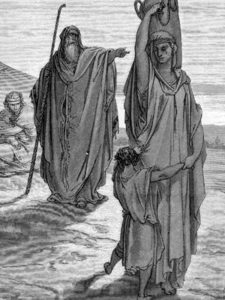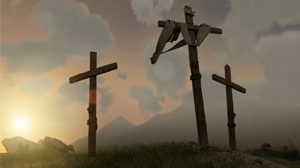Ezekiel 2:2-5
2 Corinthians 12:7-10
Mark 6:1-6a
Reflection:
When people assemble for a sporting event they yell, shout, and scream. They are not afraid to be vocal and let it all out. We all know that enthusiastic fans can’t actually win the game on their own, but most teams know the fans will give the home team an advantage. Does this have anything to do with the readings today? I think it does. Because we are talking about an energy here which flows through us as people and which we don’t control. Yet there are things we can do to encourage this energy and there are things we can do to stifle it.
Ezekiel mentions that the Spirit entered him as he was listening to the LORD. This spirit set him on his feet. He was empowered. Why did the spirit choose him? What did Ezekiel do that made the energy flow through him? Note—Ezekiel doesn’t control the details of the spirit. The Gospel slants toward the converse of the Ezekiel story. Jesus is the man whom the Spirit is supposed to enter so he can do the divine things of God. However, even though he is divine, he can’t seem to do anything in the midst of his home town because of their lack of faith. Recall the last two Sundays with the calming of the storm and the raising of Jairus’ daughter, respectively. Mark displays Jesus as having a tremendous amount of power and authority. And this Sunday, Jesus is in his hometown, and people are minimalizing his divinity. He seems powerless to do the remarkable things he has done at other places. Does this challenge your understanding of Jesus?
As one who presides over the Eucharistic assembly, I notice this energy all the time. I also notice the lack of divine energy. In fact, several years ago, during a priest’s retreat a few of us were sitting around after dinner socializing. One of the priests on retreat spoke about a liturgy which was just so difficult. He actually stopped in the middle of the Eucharistic Prayer and said, “Come on folks, I can’t do this by myself”. I was shocked he would be so bold but I completely understood where he was coming from. Then, just a couple of weeks ago I had the opposite experience. The assembly was so spirit filled, so participatory, they so wanted to be there, they made themselves present and attentive. It was truly a great prayerful liturgy. It was so powerful I found myself treasuring it all week.
These are somewhat the two extremes. Most liturgies are somewhere in between them. There certainly is an energetic dynamic which happens when people get together. We see that in sporting events. Yet Eucharist is different. When we gather to listen to God’s word and to celebrate the Eucharist we don’t claim any allegiance for a particular team like we would at a sporting event. It is actually Christ who claims an allegiance for us. And we are not there to cheer on the stars of the team, we are there because Jesus has asked us to gather together so we may share and celebrate our faith. When we are actively doing this, we are like Ezekiel, we listen to God’s Word and the Spirit enters us. If we end up minimalizing Jesus in the Eucharistic assembly, then just like today’s gospel, how can Jesus do miraculous things?
Sandwiched between these readings is Paul’s letter to the Corinthians, (2 Cor 12). This is Paul at his most vulnerable, telling us about a great paradox. He talks about this thorn in his flesh. While we don’t know for certain what that thorn was, we do hear how Paul wants God to take this from him. He even begs the Lord. Most of us can identify with this. When was the last time you told God to fix the thing you don’t like about yourself? Frequently we presume that since we don’t like these parts, God must not like them either. Yet God’s answer to Paul is clever and wise. God tells Paul to trust his weakness, and to even lean on his weakness. Rather than hiding or running away from the thing you dislike within yourself, how can you do the paradoxical thing and embrace it? Can you let God redeem it? People in recovery programs do this all the time and continue to show me the grace behind the paradox.
So we sit today with the these sacred texts: Ezekiel, a man which the spirit enters and he gets sent forth with a mission, Jesus who is amazed at their lack of faith, and Paul who paradoxically learns to accept what he doesn’t like in himself. And all of them challenge me to simply stand before God and be in awe. It is much like Mary does in the Lucan infancy narratives. She held all the things that were revealed to her and pondered them in her heart. When we do this, our faith grows.
Fr. David Colhour, C.P. is the pastor of St. Agnes Parish in Louisville, Kentucky.








